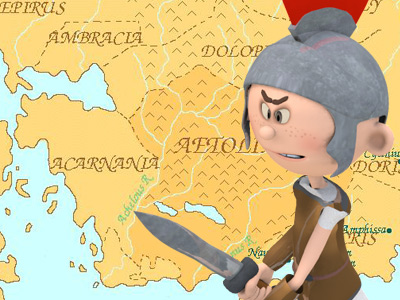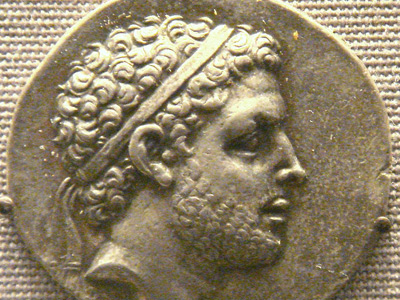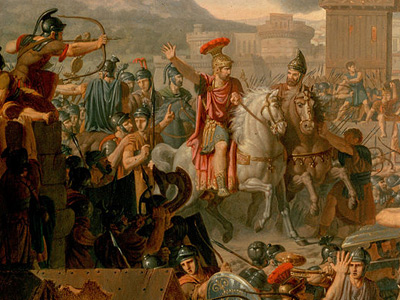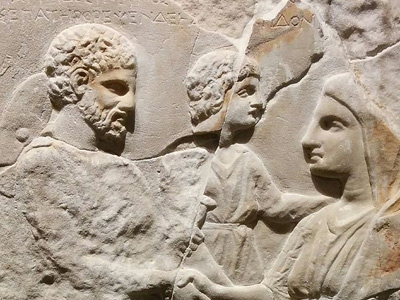Second Macedonian War (200–197 BC)
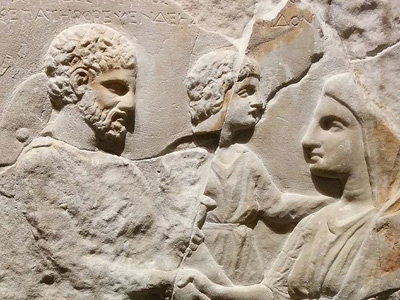
Rome Takes an Interest
Rome had just emerged victorious from the Second Punic War against Carthage. Up to this point Rome had taken very little interest in the affairs of the eastern Mediterranean. The First Macedonian War against Philip V had been over the issue of Illyria and was resolved by the Peace of Phoenice in 205 BC. Very little in Philip's recent actions in Thrace and Asia Minor could be said to concern the Roman Republic The Roman Republic was a form of government of Rome and the era of the classical Roman civilization when it was run through public representation of the Roman people. Beginning with the overthrow of the Roman Kingdom (traditionally dated to 509 BC) and ending in 27 BC with the establishment of the Roman Empire, Rome's control rapidly expanded during this period - from the city's immediate surroundings to hegemony over the entire Mediterranean world. directly. Nevertheless, the Romans listened to the appeal from Rhodes and Pergamon and sent a party of three ambassadors to investigate matters in Greece. The ambassadors found very little enthusiasm for a war against Philip until they reached Athens. Here they met King Attalus I of Pergamon and diplomats from Rhodes. At the same time, Athens declared war on Macedon and Philip sent a force to invade Attica. The Roman ambassadors held a meeting with the Macedonian general and urged Macedon to leave the Greek cities in peace, singling out Athens, Rhodes, Pergamon, and the Aetolian League as now Roman allies and thus free from Macedonian influence and to come to an arrangement with Rhodes and Pergamon to adjudicate damages from the latest war. The Macedonian general evacuated Athenian territory and handed the Roman ultimatum to his master Philip.
The Roman Republic was a form of government of Rome and the era of the classical Roman civilization when it was run through public representation of the Roman people. Beginning with the overthrow of the Roman Kingdom (traditionally dated to 509 BC) and ending in 27 BC with the establishment of the Roman Empire, Rome's control rapidly expanded during this period - from the city's immediate surroundings to hegemony over the entire Mediterranean world. directly. Nevertheless, the Romans listened to the appeal from Rhodes and Pergamon and sent a party of three ambassadors to investigate matters in Greece. The ambassadors found very little enthusiasm for a war against Philip until they reached Athens. Here they met King Attalus I of Pergamon and diplomats from Rhodes. At the same time, Athens declared war on Macedon and Philip sent a force to invade Attica. The Roman ambassadors held a meeting with the Macedonian general and urged Macedon to leave the Greek cities in peace, singling out Athens, Rhodes, Pergamon, and the Aetolian League as now Roman allies and thus free from Macedonian influence and to come to an arrangement with Rhodes and Pergamon to adjudicate damages from the latest war. The Macedonian general evacuated Athenian territory and handed the Roman ultimatum to his master Philip.
Philip, who had managed to slip past the blockade and arrive back home, rejected the Roman ultimatum out of hand. He renewed his attack on Athens and began another campaign in the Dardanelles, besieging the important city of Abydus. Here, in the autumn of 200 BC, a Roman ambassador reached him with a second ultimatum, urging him not to attack any Greek state or to seize any territory belonging to Ptolemy and to go to arbitration with Rhodes and Pergamon. It was obvious that Rome was now intent on making war on Philip and at the very same time the ambassador was delivering the second ultimatum, a Roman force was disembarking in Illyria. Philip's protests that he was not in violation of any of the terms of the Peace of Phoenice he had signed with Rome were in vain.
Polybius reports that during the siege of Abydus, Philip had grown impatient and sent a message to the besieged that the walls would be stormed and that if anybody wished to commit suicide or surrender they had 3 days to do so. The citizens promptly killed all the women and children of the city, threw their valuables into the sea and fought to the last man. This story illustrates the reputation for atrocities that Philip had earned by this time during his efforts at expanding Macedonian power and influence through the conquest of other Greek cities.
HISTORY
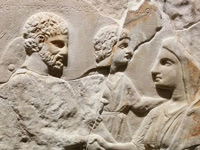
RESOURCES
This article uses material from the Wikipedia article "Second Macedonian War", which is released under the Creative Commons Attribution-Share-Alike License 3.0.
© Stories Preschool. All Rights Reserved.
